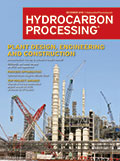
Special Focus: Plant Design, Engineering and Construction
The world economic order is rapidly changing. A transition is underway, led by the sudden collapse of crude oil and natural gas prices. Here, the pros and cons of modularization vs. field construction are outlined.
Process Engineering and Optimization
In this study, methods to optimize the consumption of dispersion steam in flares were examined at a large refinery that burns a considerable quantity of gas. The desired optimization was achieved by monitoring hydrocarbon emissions using an infrared camera (thermography).
The authors encountered pipe thermal bowing problems in recently executed projects. These practical problems are discussed in three case studies, after a brief description of the thermal bowing concept and common reasons for the occurrence of this phenomenon.
HP Top Project Awards
Details on high-impact refining and petrochemical projects presently under construction, as chosen by <i>HP</i> editors and readers.
Maintenance and Reliability
A scientific study was undertaken to evaluate the performance, under dry running conditions, of two types of diamond coatings applied to silicon carbide faces of mechanical seals.
Environment and Safety
In this two-part article, the challenges of migrating legacy safety systems are reviewed, along with the means of repeatedly and effectively executing compliant migrations. Part 2 reviews the tools-assisted process and further explores how to achieve the required compliance, quality, efficiency and rigor.
Noise pollution in oil refineries has a direct effect on worker health. Noise is the unwanted or undesirable sound produced by process control equipment, which includes valves.
Columns
What is the state of the global hydrocarbon processing industry (HPI)? Which regions and sectors are seeing growth, and which are stagnant, or possibly shrinking? These were some of the questions that <i>Hydrocarbon Processing</i> editors tackled at the 43rd Annual <i>Hydrocarbon Processing</i> Forecast Breakfast.
The reliability engineering unit supervisor (REUS) working at a 400-Mbpd refinery wrote that he was greatly concerned about a bearing temperature excursion. He realized that certain rules of thumb had been handed down to his maintenance employees, and that not all of these conveyed the same numbers and guidance.
Owner-operators across the hydrocarbon processing industry (HPI) strive to gain maximum business value from their process plant assets. Here, automation assets and other operational technology (OT) typically play a major role.
The drop in oil prices has changed the overall dynamics of the hydrocarbon processing industry (HPI), as well as reduced prices for petrochemical products. Approximately $150 B of oil and gas projects have been canceled or put on hold.
Trends and Resources
According to <i>Hydrocarbon Processing’s</i> Construction Boxscore Database, nearly 470 new projects have been announced in the downstream hydrocarbon processing industry over the past two years. New project announcements have fallen from 285 in 2015 to 185 in 2016. This trend analysis represents a year-over-year decrease of approximately 35%.
Throughout its overview series of the global refining industry, <i>Hydrocarbon Processing</i> has provided a look at the state of the refining industry, new project developments, demand outlooks for the refining sector and the move to low-sulfur fuels. The previous sections have taken a detailed look at the refining sectors of Asia-Pacific, North America and South America. This fourth and final installment analyzes major trends in Africa, Europe and the Middle East, and offers data on planned refinery capacity additions, upgrades and grassroots facilities.
Stronger demand and falling inventories allowed US gasoil cracking spreads to recover, while gasoline was supported by outages.
<i>Hydrocarbon Processing’s</i> Construction Boxscore Database is tracking more than 700 active refining projects around the world. The majority of these projects are located in the Asia-Pacific and Middle East regions.
Power generation and heating, ventilation and air conditioning (HVAC) specialty rental company, Aggreko Plc., and sulfuric acid alkylation technology licensor, DuPont, have collaborated to provide Aggreko temperature control, including chiller systems, to STRATCO sulfuric acid alkylation customers.

- Evonik presents innovative "Debonding on Demand" concept for more sustainable bonding 4/3
- Oil, gas and refined product imports exempted from Trump’s sweeping tariffs 4/3
- Reliance: India's gasoline demand to peak by 2035, diesel by 2041 4/3
- Mabanaft, HIF Global sign agreement to accelerate e-methanol adoption in the shipping industry 4/3
- Burckhardt Compression awarded digital monitoring services contract for a chemical plant in Saudi Arabia 4/3
- Lummus completes successful startup of electric heater demonstration unit 4/3




